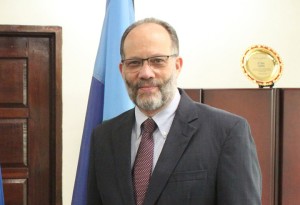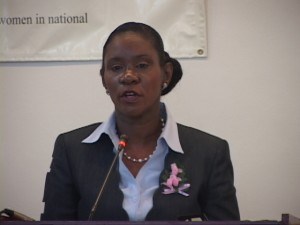Once again, as Secretary General of CARICOM, I extend best wishes to the women of the Caribbean Community on the occasion of International Women’s Day, 2003.
Since my last message in 2002, the world has continued to exist in a state of uncertainty, with the threat of war now ominously in the air. Women around the world have formed a significant part of the anti-war movement, as they know only too well the suffering endured by women and children as a result of war. As small, developing states we are also well aware of the severe economic and social repercussions that war can bring, and trust that alternative solutions can be found to deal with the major problems in the world.
I take this opportunity to focus on the deliberations of a meeting of Directors of Women’s and Gender Bureaux of CARICOM held in Grenada in September 2002, which addressed issues of concern to women in the region. One of the main issues discussed was the Convention on the Elimination of All Forms of Discrimination Against Women (CEDAW), which has been signed and ratified by all CARICOM Member States. The importance of compliance with the Convention and reporting to the international CEDAW Committee was stressed, and the meeting noted with concern that CARICOM countries have not always met their obligations in this regard in a timely fashion.
Given the significance of CEDAW to improving the status of women throughout the world, the Heads of Women’s and Gender bureaux of CARICOM passed a Resolution which urged CARICOM governments to take steps to establish a multi-sectoral committee to monitor implementation of the Convention and to provide the human and financial resources required to enable implementation, monitoring and reporting.
Also discussed at the meeting was the framework for mainstreaming gender in key CARICOM programmes, which had been approved by CARICOM Ministers with responsibility for Women’s and Gender Affairs as well as the Council for Human and Social Development in 2002. The meeting took a decision to use Education as the entry point for the gender mainstreaming strategy and, as a consequence, developed a three-year implementation strategy. The strategy includes the development of gender training modules, the conduct of research to determine the reason for gender differentials in participation and performance in education, the development of a Position Paper on the current status of the teaching profession in the region and the convening of a regional workshop to examine sex segregation of technical vocational education and its implications for higher education, career path and labour market participation.
The continuing problem of violence against women was also addressed, with reports presented on the various initiatives being undertaken. The initiatives highlighted a shift away from curative action, which had dominated the response to this issue for a long time, towards more attention to preventative measures including research on the root causes of violence against women, improving data collection, and utilizing a more integrated approach through collaboration with a range of agencies including the health sector, the police, and the legal and judicial systems.
Mention must also be made of a Regional Conference on the Administration of Justice and gender-based Violence held in early February 2003 which, while reiterating the call for investigation into the root causes of gender-based violence, insisted on a clear arrest policy for perpetrators which placed the safety of the victim and children first and recommended the mandatory inclusion of information on gender-based violence in the training of police.
The Council for Human and Social Development subsequently endorsed the strategies and actions agreed upon by the Directors of Women’s and Gender bureaux, and it is hoped that these initiatives will improve the status of women and contribute to greater gender equality in our CARICOM region.
Happy International Women’s Day 2003 to the women of our Region.





